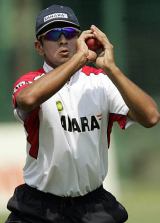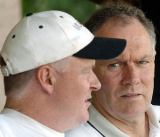'Dravid will be one of India's better captains'
Greg Chappell opens up on the reasons for victory, future planning, team building and more
|
|

|
I think it's fair to say that I was pleasantly surprised. I was quite confident that we would do well in this series, particularly after the pre-series camp in Bangalore. I thought that the atmosphere, the spirit, the general feeling around the team was very positive. Some of the tactical things we were working on really came together on the last day of the three-day camp and we talked a lot about the fact that we needed to be a lot more positive in the way we went about our cricket. We also talked about picking some players to target various bowlers in their side.
The first game probably couldn't have gone any better than it did, not least of all in the choice of Irfan at No. 3. I can't claim the credit for that and it was Sachin [Tendulkar] who spoke about the Duleep Trophy game earlier this year, when West Zone were chasing around 220-230 with [Anil] Kumble in the opposition attack. He had told Irfan to get out there and attack Kumble, and he did it with great gusto and success. The thing I like about Irfan is that he relishes that sort of challenge and wants that kind of responsibility. I think it's very hard to be successful unless you really want to take those roles on. The start we got set the scene for the series. We attacked the bowlers and they weren't expecting it. They weren't expecting Irfan to come in at No. 3 and I think that shook them a little bit. They probably might have spent some time looking at tactics for Irfan at No. 3 and then Dhoni came in at No.3 in the third game and was even more successful. I think they struggled to recover from the first game and it gave our group a real shot in the arm.
|
|
You can only play under conditions that you find yourself in. The youngsters need to be judged on the way that they've gone about their tasks. And don't underestimate Sri Lanka, they're still a formidable side. I think they've only played as well as we've allowed them to play. We've bowled with discipline and persistence, fielded really well, batted positively, built partnerships and continually put pressure on Sri Lanka. I don't think they were prepared for that. They weren't prepared for the reinvigorated team they came up against. I'm not sure that they're as bad as people are making out. I just think we outplayed them and part of that was the way the young blokes went about doing what they did.
We needed to change a few things. The way we played our cricket needed to change. Some of the tactical and strategic stuff needed a good rethink and I think it would have been hard to do that with the old group. As a coach, one thing that I do know is that you can't teach anything to anyone who doesn't want to be taught. If you're not looking to learn something, you're really going to struggle. And the one thing about these young guys is that they're soaking up the information. They want to know more, and are trying to find out what they can do to be better. That's the attitude that makes the coach's life much easier.
|
|

|
It's an aspect that cannot be underestimated. Rahul took the job with gusto. He was obviously ready for it, and he'd obviously given it quite a deal of thought. It was very important that it became his team. It wasn't my team but his team. I've said many times that the coach's role is in helping prepare the team and in working with the captain and supporting the captain. On match days, he's certainly the most important man. The support staff's role is to take as much pressure off him during the preparation period so that he's got time to devote to developing his own game and preparing himself properly. And the way he went about the lead-up to the first game, the way he captained the team in the first game, and the way he played in that first game has had a huge impact on the team and a huge impact on the result of this series. He is going to go from strength to strength. I have no doubt that history will show him to be one of the better captains that India have had.
Not really. We'll probably keep tinkering over the edges and looking at different options, trying to build even more flexibility in the group if that's possible. I don't think there are any glaring weaknesses, but that's not to say that we shouldn't keep being vigilant about what the opposition teams are doing, and develop strategies to counter them. England is obviously an emerging team and there will be other teams who will be rebuilding their one-day side. We're going to have to continue to be rigorous with our preparation and our training to make sure that we are as flexible as possible to cope with whatever conditions and whatever occurrences happen in any of the games.
|
|
I don't want to give too much away from the point of view of exactly what we're thinking about. But basically, if you're worrying about the outcomes, about things you can't control, then you're going to get into trouble. We really focused on the areas that we can control and we're focusing on getting good in those areas. We're making sure that we engender the culture of creating successful habits. That's something we've worked very hard on over the last few months and we saw the benefits during the Sri Lankan series.
It's not in quantitative terms, but we've told the players to be prepared to accept challenges and look forward to them. We're urging them to welcome the opportunity to try something different - bat in a different positions, bowl at a different times in the innings, and field in different positions. We're telling them to start to embrace challenges as an opportunity to improve, rather than seeing it as an opportunity to fail. And I think we've also tried to give the players the encouragement to know that the odd failure is not going to be too much of a problem provided that they're trying to follow the success processes we've set in place. I think one of the things that has pleased me is the way that the players have welcomed these challenges and been successful in most cases. It's not a bad thing sometimes for a top-order batsman to bat down the order or a middle-order batsman to bat up the order, just to start to appreciate the problems the other players have.
I think that's where the processes come in very strongly. In these two situations, if you're worried about the outcomes you will never perform well. The most pleasing aspect from my point of view is that the players have adhered to the processes that we've worked on and it's played a very important part in our success. The players are getting more and more confidence in seeing that if you work the processes, the process works. They're continuing to be even more vigilant and even more rigorous in applying those processes in those pressure situations. And the only way you can deal with pressure is if you take it on, confront it and approach it as an opportunity to get better and not an opportunity to fail. Throughout the series, they haven't panicked; they've stuck to the processes, seen that those processes work, and got better and better.
|
|

|
We've planned a little bit, but the fact is that the processes apply whether it's Sri Lanka, South Africa, Australia, England or whoever it is. There are certain things that don't change, it's the nuances that change with the different team. We don't know South Africa as well as we knew Sri Lanka, who we played a few months ago. So we had some recent information and intelligence that we could use and that helped us at the start of the series. We won't be quite as well prepared in that regard, but again neither will they. They wouldn't have seen us for a long time either and they may not be expecting what they will find.
Siddhartha Vaidyanathan is staff writer of Cricinfo